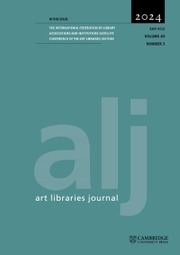Collective Collection
A Collective Collection refers to the shared resources of multiple libraries, archives, and museums. Collective Collections can be leveraged to benefit all institutional stakeholders, including researchers, scholars, students, and patrons.
OCLC Research’s Collective Collection work provides evidence and insight to support decision-making into how cultural heritage institutions organize shared collections and services. Through this work, OCLC Research is helping to create a more connected, collaborative landscape for libraries, archives, and museums, with the goal of making collections more accessible, impactful, and cost-efficient.
Publications

Specialized and Decentralized: Stewardship of the Art Research Collective Collection
7 November 2024
Chela Scott Weber, Mercy Procaccini, Dennis Massie, Brian Lavoie
Shares findings and recommendations from the Operationalizing the Art Research Collective Collection project to provide art libraries with important resources as they seek to address their sustainability challenges through collaborative approaches.

Sustaining Art Research Collections: Case Studies in Collaboration
18 April 2023
Dennis Massie, Chela Scott Weber, Mercy Procaccini, Brian Lavoie
This report shares recommendations for building successful collaborations and identifies typical challenges library partnerships navigate based on case study research of current art library collaborations.

Sustaining Art Research Collections: Using Data to Explore Collaboration
15 February 2023
Brian Lavoie, Dennis Massie, Chela Scott Weber
This report explores collaboration opportunities between art, academic, and independent research libraries by analyzing WorldCat bibliographic and holdings data and WorldShare interlibrary loan transaction data.

Tiers for Fears: Sensible, Streamlined Sharing of Special Collections
8 July 2013
Dennis Massie
This report presents strategies for providing efficient and affordable interlending of actual physical items from special collections for research purposes, as well as advice on determining if a loan is the most appropriate way to fulfill a particular request.